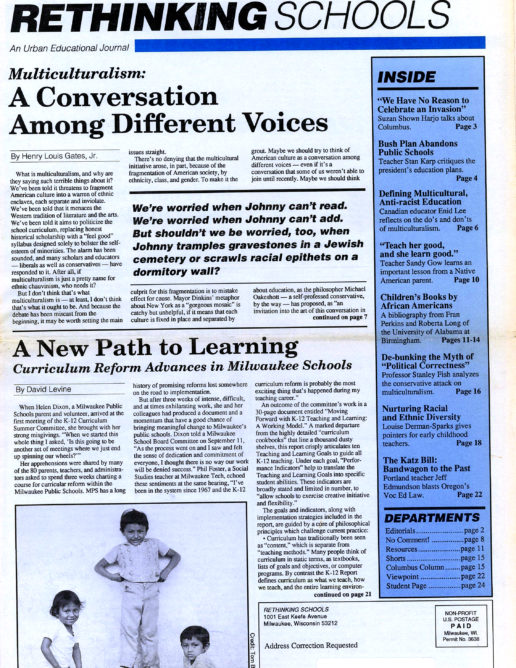Multiculturalism: A Conversation Among Different Voices
What is multiculturalism, and why are they saying such terrible things about it? We’ve been told it threatens to fragment American culture into a warren of ethnic enclaves, each separate and inviolate.
We’ve been told that it menaces the Western tradition of literature and the arts. We’ve been told it aims to politicize the school curriculum, replacing honest historical scholarship with a “feel good” syllabus designed solely to bolster the self-esteem of minorities. The alarm has been sounded, and many scholars and educators –– liberals as well as conservatives — have responded to it. After all, if multiculturalism is just a pretty name for ethnic chauvinism, who needs it?
But I don’t think that’s what multiculturalism is — at least, I don’t think that’s what it ought to be. And because the debate has been miscast from the beginning, it may be worth setting the main issues straight.
There’s no denying that the multicultural initiative arose, in part, because of the fragmentation of American society, by ethnicity, class, and gender. To make it the culprit for this fragmentation is to mistake effect for cause. Mayor Dinkins’ metaphor about New York as a “gorgeous mosaic” is catchy but unhelpful, if it means that each culture is fixed in place and separated by grout. Maybe we should try to think of American culture as a conversation among different voices — even if it’s a conversation that some of us weren’t able to join until recently. Maybe we should think about education, as the philosopher Michael Oakeshott — a self-professed conservative, by the way — has proposed, as “an invitation into the art of this conversation in which we learn to recognize the voices…”
Common sense says that you don’t bracket 90% of the world’s cultural heritage if you really want to learn about the world.
To insist, then, that we “master our own culture” before learning others only defers the vexing question: what gets to count as “our” culture? What makes knowledge worth knowing? There’s a wonderful bit of 19th Century student doggerel about the great Victorian classicist Jowett, which nicely sums up the monoculturalist’s claims on this point;
Here I stand, my name is Jowett
If there’s knowledge, then I know it.
I am the master of this college:
What I know not, is not knowledge.
Unfortunately, as history has taught us, an Anglo-American regional culture has too often masked itself as universal, passing itself off as our “common culture,” and depicting different cultural traditions as “tribal,” or “parochial.” So it’s only when we’re free to explore the complexities of our hyphenated American culture that we can discover what a genuinely common American culture might actually look like. Is multiculturalism un-American?
Herman Melville didn’t think so. As he wrote, “We are not a narrow tribe, no…We are not a nation, so much as a world.” Common sense reminds us that we’re all ethnics: and the challenge of transcending ethnic chauvinism is one we all face.
Granted, multiculturalism is no magic panacea for our social ills. We’re worried when Johnny can’t read. We’re worried when Johnny can’t add. But shouldn’t we be worried, too, when Johnny tramples gravestones in a Jewish cemetery or scrawls racial epithets on a dormitory wall? It’s a fact about this country that we’ve entrusted our schools with the fashioning and refashioning of a democratic polity: that’s why the schooling of America has always been a matter of political judgement. But in America, a nation that has theorized itself as plural from its inception, our schools have a very special task.
Ours is a society that simply won’t survive without the values of tolerance: and cultural tolerance comes to nothing without cultural understanding. In short, the challenge facing America in the next century will be the shaping, at long last, of a truly common public culture, one responsive to the long silenced cultures of color. For if we relinquish the ideal of America as a plural nation, we abandon the very experiment that America represents. And that, surely, is too great a price to pay.

